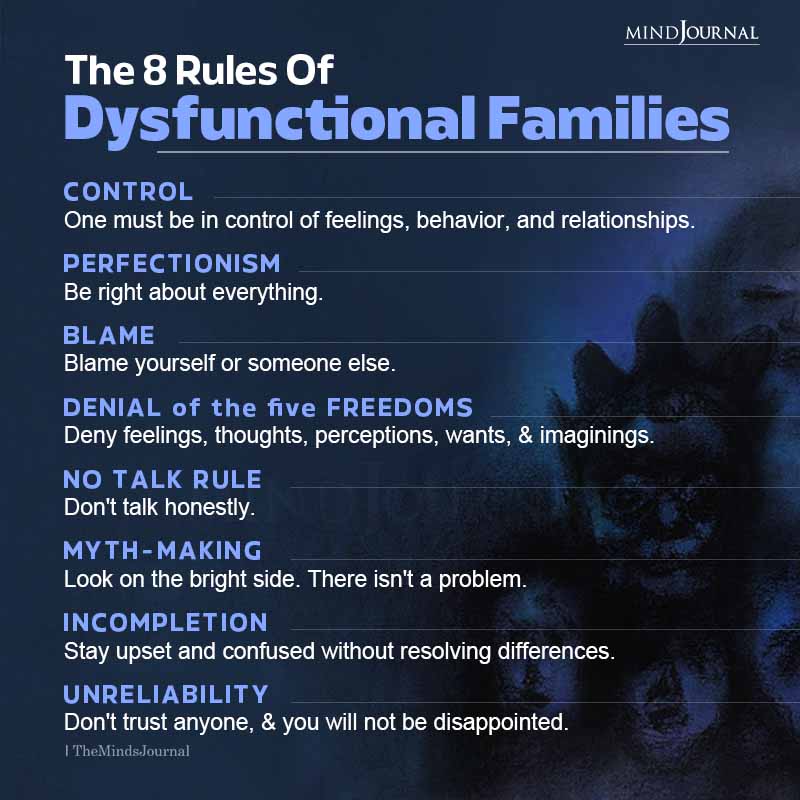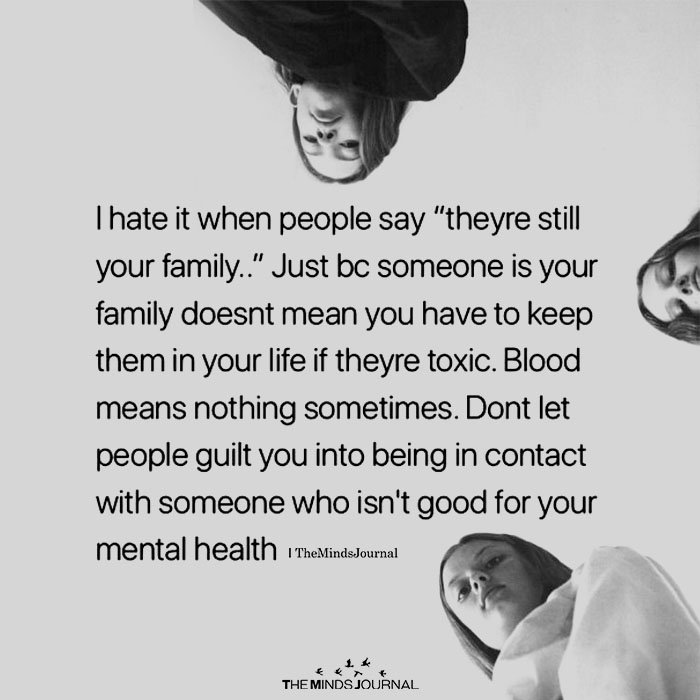Family is everything, right? No matter what happens, our families will always be there for us, being a pillar of strength. But this rings true for normal families, not dysfunctional families. When you belong to a dysfunctional family, love, support, and understanding are hard to come by, and all you are ever left with is pain, heartbreak, trauma, and humiliation.
Now the catch is that there are different types of dysfunctional families, namely five. Even though trauma and toxicity are the common denominators for all the types, in certain aspects they do vary. But no matter which type of dysfunctional family you belong to, one thing is for sure – it’s hard to deal with them. So, what are the different types of dysfunctional families?
Before we get into the dysfunctional family types, it’s important to understand what is dysfunctional family.
What Is A Dysfunctional Family?
A dysfunctional family is a family that is characterized by neglect, abuse, misbehavior, and cruelty. In dysfunctional families, there is no compassion, empathy, love, and support given to children by their parents, instead, all they get is neglect, humiliation, trauma, and pain.
The relationships between family members are mostly toxic and unhealthy. Children growing up in such families end up thinking that this is how normal families work, and they tend to normalize all the toxic and abnormal things they are put through since they were children.
They grow up believing that they don’t deserve happiness, love, and healthy relationships, as they have a hard time dealing with and letting go of childhood neglect and trauma.

22 Signs Of A Dysfunctional Family

Even though there are different types of dysfunctional family, there are some characteristics and signs that are common in all of them. They are:
- Lack of boundaries
- Physical, sexual, emotional, mental, and psychological abuse
- Constant humiliation
- Lack of compassion and empathy
- Addiction and substance abuse
- Controlling behavior
- Constant criticism
- Toxic perfectionism
- Violence
- Lack of emotional support
- Lack of privacy and independence
- Mental health issues and mental illness
- Fear of abandonment
- Low self-worth and self-esteem
- Lack of confidence in children
- People-pleasing tendencies
- Gaslighting and manipulation
- Name-calling and threatening
- Withholding parental love and affection
- Constant ridicule, bullying, and spitefulness
- Constant invalidation of feelings
- Excessive suspicion and jealousy
Related: 8 Characteristics Shared By Dysfunctional Families
Main Causes Of A Dysfunctional Family
There are various factors that can lead to the creation of a dysfunctional family. Here are some of the most probable ones:
- Alcoholism and other forms of substance abuse
- Abuse (physical, mental, emotional, and psychological)
- Untreated mental health issues and illnesses
- Lack of support, especially emotional and mental
- Financial difficulties
- Chronic illness
- Behavioral issues
- Mental health struggles
- History of dysfunctional family patterns
- Intergenerational trauma
- Unhealthy attachment styles
5 Types Of Dysfunctional Families
1. Conflict-driven
Heated arguments, tense situations, frequent and violent fights, and constant screaming and yelling are what define a conflict-driven family. There is no semblance of peace in the house, and every little thing escalates into a huge and disturbing conflict. Family members are constantly starting fights with each other and provoking each other.
If one family member feels threatened and annoyed, they push back harder and this vicious cycle continues, day in and day out. Children growing up in a family like this more often than not end up suffering from acute stress, anxiety, and depression. They are always on their toes and always end up being in chaotic and unhealthy relationships, perfectly mirroring their family dynamics.

2. Emotionally detached
As the name suggests, families that lack emotional intimacy are dysfunctional for sure. A healthy and normal family is based on the values of love, togetherness, and support, and if a family doesn’t have these qualities, then it’s just called a family for the sake of it. In emotionally detached families, affection and warmth are completely missing, and family members don’t even hug each other.
This lack of affection, especially parental affection forces children to bottle up their feelings and suffer on the inside. They are made to believe that showing emotions are a waste of time, so it’s always better to suppress all of it. This leads to self-esteem issues and low self-worth, and such children gradually develop anxious and avoidant attachment styles.
They end up having a string of failed relationships in their adulthood and also develop a fear of abandonment. Because their parents never showed them the love they deserved, they feel unworthy and worthless; their wounded inner child prevents them from being happy.
Related: 7 Major Signs You Belong To An Abusive And Toxic Family
3. Substance abuse
A family where addiction runs rampant is one of the most disturbing and dysfunctional families you can be in. If one of your parents or both parents abuse drugs or alcohol, or both, it can lead to a chaotic and traumatic childhood for you.
Most of your basic needs are not met by such parents, for example, they may forget to pick you up from school, forget your birthday, not give much importance to cooking meals, or worse still, beat you up in a drug or alcohol-induced rage.
From a very young age, you learn to take care of yourself and your parents and this changes you mentally and emotionally. Additionally, you might also be blamed for the problems created by your parents, and you might even have to clean up their messes, literally and metaphorically.
Children belonging to such families end up suffering from depression, anxiety, and Post-Traumatic Stress Disorder (PTSD) in their adulthood and are also at risk of developing substance abuse disorders, like their parents. They also find it hard to build healthy and stable relationships with others.
4. Violent
Growing up in a violent family is something no one deserves to go through. Violence is not just physical all the time, it can be emotional, mental, sexual, verbal, or psychological even. For many children, witnessing violence against their family members is enough to traumatize them for life, even if they are not on the receiving end of it.
Along with a psychological and mental impact, childhood trauma can also cause a physical impact too on children, namely changes in their brains. These changes can often lead to substance abuse and several psychiatric disorders in the future.
Research has observed the following changes in their brains:
- Excessive activity in the amygdala, which is known as the brain’s fear center.
- A smaller hippocampus which is the area of the brain responsible for memory and learning.
- The prefrontal cortex reduces in size, which affects impulse control, judgment, and planning capabilities.
- The volume of the cerebellum reduces which ends up affecting your thoughts, and coordination of physical movements.
5. Authoritarian
In authoritarian families, the only motive of parents is to dominate their kids and make sure that it’s their way or the highway. They have great expectations from their children and unending demands, but they never give any sort of emotional support or validation. Physical abuse and punishment are also a common feature of such families, with corporal punishments like spanking, beating, and yelling being their favorite ones.
Children are only expected to follow the rules and demands set by their parents, and they are not allowed to explore who they are and what they want from life. They end up suffering from self-esteem issues, depression, anxiety, and Obsessive-Compulsive Disorder (OCD) in adulthood.
They might even be overly shy or aggressive in social situations since they find it difficult to regulate their emotions in a healthy way.
Related: 7 Common Traits Shared By People Who Grew Up In Dysfunctional Families
How To Deal With A Dysfunctional Family
The effects of growing up in a dysfunctional family are several, but the good news is that you can deal with it and overcome the pain and trauma caused by belonging to one.
Here is what you can do to deal with a toxic and dysfunctional family:
- Lean on people who have your good interests at heart, they can be your friends, partner, or even a family member who is going through the same thing as you but is not toxic like your parents. This will help you feel less alone, and moreover, it will help you deal with the toxicity you experience on a daily basis.
- Try to understand that how your parents treat you is not a reflection of who you are, rather it’s a reflection of who THEY are as people. The moment you make this breakthrough, they won’t be able to control you anymore, and nor will their actions affect you as much.
- Stop thinking of yourself as a victim, because as long as you stay in that zone, you will never be able to change or make a difference in your life. Acknowledge what you have gone through, process it, accept it, dive deep into your reservoir of resilience, and give yourself the strength you need to deal with this. Remember that you’re not a victim, you’re a warrior and only you get to decide how your life will look like and how you want to feel.
- Develop healthy relationship skills, even if you were never taught how to. Since you come from a toxic family, you need to have healthy bonds in your life more than ever. Healthy relationships can help you tremendously when it comes to dealing with all the tough stuff.
Growing up in a dysfunctional family can cause a lot of pain and trauma in your life, and experiencing all of it and dealing with it can be so difficult. But don’t let your toxic family decide the course of your life or who you are supposed to be as a human being; that’s only up to you. You have so much to live for and your dysfunctional family has absolutely no say in that.
Want to know more about what a dysfunctional family looks like? Check this video out below!
Frequently Asked Questions (FAQs)
How to walk away from a dysfunctional family?
Some of the best things you can do if you are thinking of walking away from your dysfunctional family are focusing on responding instead of reacting, accepting them as they are, and understanding that they’re never going to change, setting strict emotional and physical boundaries and lastly, maintaining your distance from them as much as you can.
Is dysfunctional family and toxic family same?
Yes, dysfunctional and toxic families are the same because they function in the same way and according to the same toxic principles.
Can dysfunctional families ever change?
There is almost no chance that your dysfunctional family will ever change. In order to change for the better, it’s important to think in a positive and united way, and toxic people are incapable of doing this.











Leave a Reply